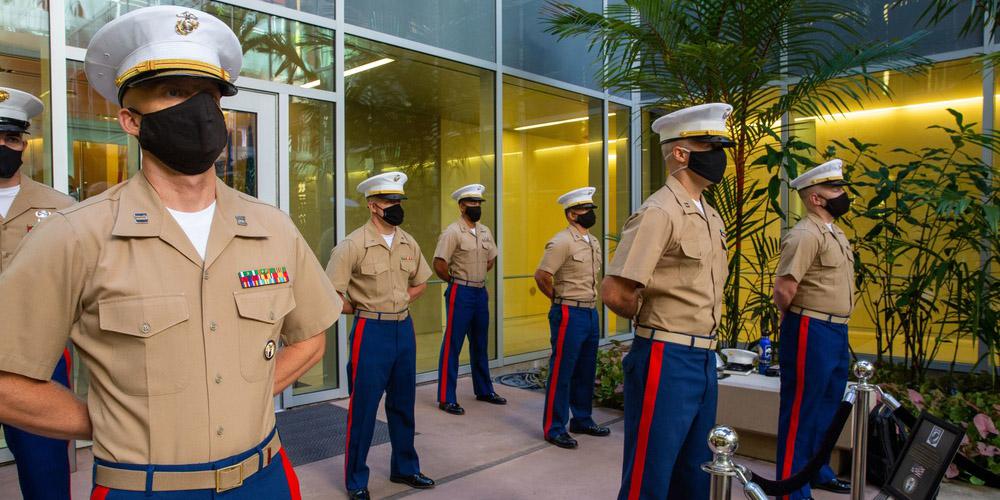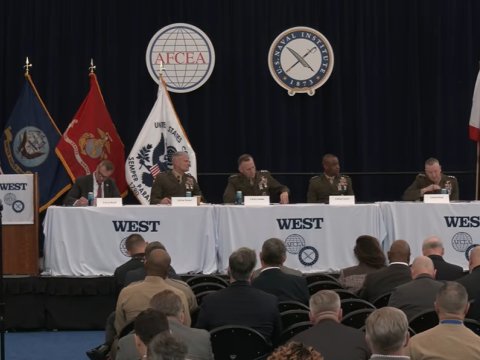Marine Corps Doctrine Steers Toward Information
The U.S. Marine Corps issued their eighth doctrine, MCDP 8, Information, on June 29. The policy lays out a clear alignment for Marines to harness and protect information on the modern-day battlefield.
Information is an instrument of national power, the doctrine indicates. Warfighters must excel in using this foundational element of intelligence, and command and control. Operations across all domains—sea, air, land, space and cyberspace—depend on information, and as such, MCDP 8 calls on all Marines to know how to leverage information for military benefit. Moreover, given that the time it takes for specific information to reach a global audience can be mere minutes or seconds, the doctrine asks Marines to understand how their actions and operations connect into a global information environment.
Overall, the Marines must improve their abilities, or tradecraft, around information, said Lt. Gen. Matthew Glavy, USMC, the service’s deputy commandant for information (DCI), speaking with Eric Schaner, senior information strategy and policy analyst, Office of the DCI, in a call with reporters about MCDP 8 on June 28.
“With the Marine Corps, we’ve talked about being a combined arms force,” Gen. Glavy said. “That's the full integration of fires in such a way that if the adversary counters one, he or she becomes more vulnerable to another. It creates a dilemma. This idea of combined arms is how we integrate maneuver and fires in this battlespace. And now we have thrown information on top of that and realized that there are certain enabling capabilities, trade craft and other things, such as imagination, at the forefront of it that Marines can bring to bear to be successful here. We have built this on the idea of how the information space is going to require different tradecraft.”
Gen. Glavy emphasized that the policy will need to be updated over time to consider the current atmosphere. The policy may only be good for two-to-three years before it needs to be renewed, he said, to reflect a fast-changing informational atmosphere driven by technological advancements.
According to the document, “while our theory and principles of the information warfighting function will endure, we must continually examine and adapt our application of them to keep up with the ever-changing characteristics of the information environment.”
Current geopolitical events helped inform the first version of this policy. Russia’s invasion of Ukraine and how the countries are wielding information in the war represents a clear teaching point for Marines, Gen. Glavy shared. “As we wrote this document and as everything unfolded in Ukraine and really how the information fight has played out, it was obviously very much in the information space and the commandant [Gen. David Berger] wanted to make sure we captured that to the best of our ability,” he said.
The doctrine calls on all Marines—of all ranks—to generate and protect information, the general stated. One aspect of that responsibility means that Marines need to be conscious of the information they are creating and posting. “Part of it is ensuring that Marines are skilled and recognizing their use of social media and their use of it can pose risks, that their use of it can expose them to foreign targeting and influence,” Gen. Glavy stated.
MCDP 8 states, “Marines must assume that their actions will be exposed and communicated globally and distorted and manipulated by their adversaries to achieve a disproportionate or a globally significant event.”
Another key consideration is that in today’s digital age, information can potentially reach right into the battlefield, whereas in the last century, information warfare was mostly defined by geographic boundaries, Gen. Glavy explained. “When you assign a commander an area of operations to work in, in the 20th Century that was largely defined by geographic boundary, but we now know that through hyper-connectivity and with the global reach of adversaries, they can reach into a commander's area of operations and affect those operations. And so, what we must do and what MCDP 8 will help us do is develop training and education for commanders, staff and planners to be able to leverage the information enterprise.”
And that training will be tailored to reach all generations of Marines, Schaner emphasized. Service leaders have started to consider training needs and implications of MCDP 8, the general added. “We have already been down to all the Marine Corps schools, having this discussion from with [our leadership], getting a feel for that, because if we miss this from a generational aspect, shame on us,” he said.
The doctrine also will drive the changes the Marine Corps needs to dominate and win on the battlefield, Schaner stated. “MCDP 8 resolves a gap in our thinking, first and foremost, by providing a more unified approach to how we view the battlespace and then from that we can organize our community around that as well as our capabilities,” he said. “I think the gaps that it helps to address are our thinking and then the way we approach the development of information related to our community and how we organize and employ them, and then how we frame our capabilities assessment process to derive requirements. This provides an overarching framework to think about that.”





Comments